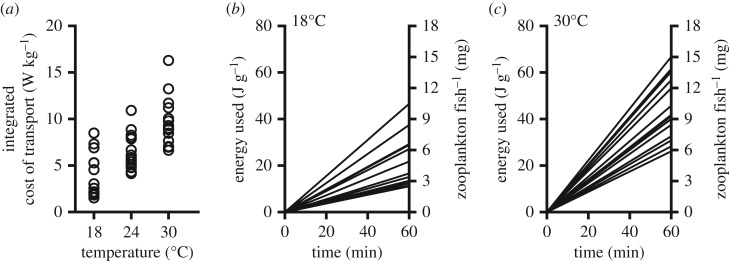Figure 2.
Differential energetic costs of transport between individual zebrafish (D. rerio). We used previously published data (from Seebacher et al. [41]) to show that the cost of transport (integrated across speeds from 0 to 0.35 m s−1 in W kg−1 within each individual; see Seebacher et al. [41] for methods) varies considerably among individuals within groups and across different temperatures (n = 15 fish at each of 18, 24 and 30°C); (a) we used these data to determine individual variation in the energetic cost (J g−1 wet mass; b, c, left y-axis) of moving at a slow speed (0.05 ms−1 or approx). 1–2 body lengths s−1) for 1 h (each line represents one animal). The energetic cost of moving for 60 min increased significantly with increasing temperature from 18°C (b) to 30°C (c; data for 24°C not shown). We expressed energetic cost as the quantity of zooplankton an average-sized (0.5 g) fish would need to eat to recover the energy used for movement (right y-axis). After 1 h of moving together, the fish with the highest cost of transport would need to consume up to 10 mg more zooplankton (approx. 2% of body mass at 30°C) than the fish with the lowest cost of transport. Ultimately, these differences in energetic cost of movement may lead to fission of schools.

